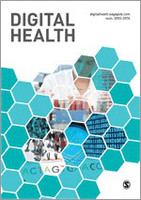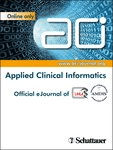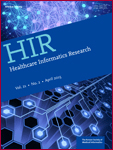
Digital Health
Scope & Guideline
Pioneering the Digital Frontier of Health and Medicine.
Introduction
Aims and Scopes
- Digital Health Interventions:
Focuses on the development, implementation, and evaluation of digital health tools and interventions, including mobile health applications and telehealth services that aim to improve patient outcomes and healthcare delivery. - Artificial Intelligence in Healthcare:
Explores the application of AI and machine learning technologies for diagnostics, treatment predictions, and enhancing healthcare processes, emphasizing the integration of these technologies into clinical practice. - Patient Engagement and Self-Management:
Investigates strategies to enhance patient engagement through digital platforms, including self-management tools that empower patients to take control of their health conditions. - Telemedicine and Remote Monitoring:
Covers the expansion of telemedicine practices and remote patient monitoring systems, particularly in response to the COVID-19 pandemic, highlighting their efficacy and challenges. - Health Data Analytics and Digital Health Literacy:
Examines the role of health data analytics in improving health outcomes and the importance of digital health literacy among patients and healthcare providers. - Behavioral Health and Mental Health Technologies:
Focuses on the development and efficacy of digital tools addressing mental health issues, including mobile apps for mental health support and therapy.
Trending and Emerging
- Wearable Technology and IoT in Health:
Increased focus on wearable devices and Internet of Things (IoT) applications for health monitoring and management, showcasing their potential in chronic disease management and preventive healthcare. - Personalized Digital Health Solutions:
Emerging interest in developing personalized health interventions that leverage individual data, enhancing patient engagement and adherence through tailored digital solutions. - Integration of AI and Machine Learning:
Growing emphasis on the integration of AI and machine learning in predictive analytics and clinical decision support systems, highlighting their role in improving diagnostic accuracy and treatment efficacy. - Social Media and Digital Health Discourse:
Exploration of the role of social media in shaping health behaviors and public health communication, particularly in relation to health misinformation and community engagement. - Digital Health Equity and Accessibility:
Emerging discussions on health equity and the accessibility of digital health tools, focusing on addressing disparities among different populations and ensuring inclusive health solutions.
Declining or Waning
- Traditional Healthcare Models:
There has been a noticeable decline in publications focusing solely on traditional healthcare delivery models, as the emphasis shifts towards integrating digital tools and technologies into existing systems. - Static Health Education Methods:
Research on static, non-interactive health education methods is decreasing, as there is a growing preference for dynamic, engaging digital platforms that facilitate active participation and real-time feedback. - General Telehealth Discussions:
The broad discussions surrounding telehealth as a concept are waning, with a shift towards specific applications, technologies, and methodologies that enhance telehealth services and patient outcomes. - Single-Discipline Approaches:
There is a declining interest in studies that focus on single-discipline approaches in healthcare, as interdisciplinary collaborations become more prominent in addressing complex health challenges.
Similar Journals

GESUNDHEITSWESEN
Exploring Interdisciplinary Solutions in Health SciencesGESUNDHEITSWESEN, published by GEORG THIEME VERLAG KG, is a leading journal in the fields of Medicine and Public Health, with an ISSN of 0941-3790 and an E-ISSN of 1439-4421. Since its inception in 1992, it has provided a vital platform for the dissemination of research and scholarly articles pertinent to various aspects of health sciences, reflecting the journal's commitment to advancing knowledge and practice in the medical domain. With its current ranking in the third quartile (Q3) in both Medicine (miscellaneous) and Public Health, the journal continues to thrive through a diverse array of contributions that support the interdisciplinary nature of health studies. Though not open access, the journal ensures that high-quality research is accessible to its audience through institutional and personal subscriptions. With a converging timeline leading to 2024, GESUNDHEITSWESEN remains an essential resource for researchers, healthcare professionals, and students seeking current insights into health-related issues and solutions.

npj Digital Medicine
Shaping the Future of Medicine with Open Access Knowledgenpj Digital Medicine is a leading journal in the interdisciplinary landscape of digital health, published by NATURE PORTFOLIO. Since its inception in 2018, this open-access journal has rapidly established itself as a premier platform for innovative research and insights at the intersection of technology and healthcare. With an impressive impact factor and ranked in the Q1 category across multiple fields—including Computer Science Applications, Health Informatics, and Medicine—npj Digital Medicine represents the forefront of research aimed at revolutionizing patient care and healthcare delivery through digital advancements. The journal is positioned in the top percentiles of Scopus rankings, highlighting its vital role in shaping the future of medicine in an increasingly digital world. By providing a space for rigorous research and practical applications, npj Digital Medicine invites contributions from researchers, clinicians, and technologists eager to explore novel solutions to contemporary health challenges, ultimately enhancing patient outcomes on a global scale.

JOURNAL OF MEDICAL INTERNET RESEARCH
Advancing the Future of Digital HealthJOURNAL OF MEDICAL INTERNET RESEARCH, published by JMIR PUBLICATIONS, INC, stands as a pivotal resource in the field of Health Informatics, with an esteemed ranking of #7 out of 138 in the Scopus database, placing it in the top 95th percentile. Since its inception in 1999, this Open Access journal has been committed to disseminating high-quality, peer-reviewed research that explores the intersection of healthcare and internet technologies. With its headquarters in Toronto, Canada, the journal encompasses a broad range of topics, including eHealth, telemedicine, and mobile health innovations. The impact factor and its Q1 quartile ranking highlight the journal's significant influence and prevalence in advancing the understanding of digital health landscapes. Researchers, professionals, and students alike benefit from its valuable insights, making the JOURNAL OF MEDICAL INTERNET RESEARCH an essential tool for fostering informed practices and policy-making in the rapidly evolving domain of health informatics.

Interactive Journal of Medical Research
Unlocking the future of health informatics, one study at a time.The Interactive Journal of Medical Research (ISSN: 1929-073X; E-ISSN: 1929-073X) is an esteemed publication by JMIR Publications, Inc., renowned for its commitment to advancing the field of medical research through innovative and accessible scholarship. As an Open Access journal since 2012, it provides researchers, clinicians, and students around the globe with the opportunity to access cutting-edge studies without any subscription barriers, thereby promoting the rapid dissemination of knowledge in the rapidly evolving landscape of health and medical informatics. The journal's scope encompasses a diverse range of topics, including health data analytics, digital health innovations, and user-centered design in medical software, making it an essential resource for those seeking to stay at the forefront of medical research. With a dedicated readership and a focus on real-world applications, this journal plays a pivotal role in fostering collaboration among professionals and nurturing the next generation of researchers in the medical field. For further details, visit JMIR Publications' website and explore the wealth of resources available.

Zeitschrift fur Evidenz Fortbildung und Qualitaet im Gesundheitswesen
Navigating the future of healthcare with evidence-based knowledge.Zeitschrift für Evidenz Fortbildung und Qualität im Gesundheitswesen, published by Elsevier GmbH, serves as a pivotal platform for the dissemination of research and innovations within the realms of health policy, medicine, and education. Established in 2008 and continuing its impactful trajectory through 2024, this journal boasts a recognition as a Q2 journal in Education and positions itself within the Q3 tier for both Health Policy and miscellaneous Medicine categories, reflecting its dual focus on scholarly rigor and practical application. Despite not being an Open Access journal, it remains a valued resource for academics and practitioners, evidenced by its rankings: #214 out of 398 in Medicine (miscellaneous) and #829 out of 1543 in Social Sciences (Education) according to Scopus metrics. The journal's commitment to enhancing education and quality in healthcare makes it an essential read for researchers, professionals, and students seeking to stay abreast of the latest evidence-based practices and policies that shape health outcomes worldwide.

Applied Clinical Informatics
Empowering clinical excellence with technology-driven insights.Applied Clinical Informatics is a leading journal dedicated to the expanding field of health informatics and its applications within clinical settings. Published by GEORG THIEME VERLAG KG in Germany, this journal serves as a pivotal platform for researchers and professionals engaged in the integration of technology and healthcare, aiming to improve patient outcomes through innovative informatics solutions. With a solid Q2 ranking in multiple disciplines including Computer Science Applications, Health Informatics, and Health Information Management, it reflects its prominent position in the academic landscape. The journal provides accessible content while fostering dialogue on key issues and advancements in clinical informatics. Covering a wide array of topics from data management to e-health applications, Applied Clinical Informatics is essential reading for those looking to stay attuned to the latest research and developments from 2009 to 2024, enriching the knowledge base of students, professionals, and researchers worldwide.

International Journal of E-Health and Medical Communications
Transforming healthcare through digital innovation.Welcome to the International Journal of E-Health and Medical Communications, a pivotal publication designed to bridge the gap between health informatics and computer science applications. Published by IGI Global, this journal serves as a platform for innovative research and insights into e-health technologies, health communication strategies, and the evolving role of digital tools in enhancing healthcare delivery and management. With an ISSN of 1947-315X and E-ISSN 1947-3168, it caters to an audience keen on advancing the intersection of technology and health, as evidenced by its respectable standings in Scopus rankings—positioned in the 64th percentile in Health Informatics and 63rd in Computer Science Applications. Over its publication history from 2010 to 2024, the journal has consistently contributed to significant discussions and advancements within these fields, highlighted by its Q3 quartile ranking in 2023. Join a community of researchers, professionals, and students dedicated to the ongoing exploration of e-health, as we collectively navigate the complex landscape of healthcare innovation.

Health Information Management Journal
Innovating Health Systems with Cutting-Edge ResearchHealth Information Management Journal, published by SAGE Publications Inc., is a premier academic resource dedicated to the intersection of health informatics, health information management, health policy, and leadership in health services. With an impressive track record since its inception in 2002, this journal steadily contributes to scholarly dialogue and innovation in the field, holding a commendable Q2 ranking in Health Informatics, Health Information Management, and Health Policy, and a distinguished Q1 ranking in Leadership and Management as of 2023. As a critical platform for researchers, professionals, and students, it fosters the dissemination of cutting-edge research and practical applications, bridging the gap between theory and practice. Though not an open-access journal, it provides a wealth of subscription-based resources that are invaluable for advancing knowledge and improving health systems globally. The journal’s commitment to high-quality, peer-reviewed content ensures that it remains a vital tool for anyone invested in the future of health information management.

Healthcare Informatics Research
Empowering research to transform healthcare systems globally.Healthcare Informatics Research, published by the Korean Society of Medical Informatics, is a leading open access journal that has been advancing the field of healthcare informatics since its inception in 2010. With an ISSN of 2093-3681 and E-ISSN of 2093-369X, the journal provides a vital platform for disseminating high-quality research aimed at improving healthcare systems through innovative informatics solutions. Recognized for its contributions, it holds a Q2 rank in Biomedical Engineering and Q3 rankings in both Health Informatics and Health Information Management for 2023, reflecting its stature within the academic community. The journal is committed to open access, ensuring that research is freely accessible to researchers, professionals, and students worldwide, thus promoting knowledge sharing and collaboration. Located in the dynamic city of Seoul, South Korea, the journal serves as a hub for groundbreaking studies that impact health systems globally, making it an essential resource for those at the forefront of healthcare technology and management.

INFORMATION RESEARCH-AN INTERNATIONAL ELECTRONIC JOURNAL
Transforming Information Research for Tomorrow's Scholars.INFORMATION RESEARCH - AN INTERNATIONAL ELECTRONIC JOURNAL is a distinguished open-access journal published by the University of Sheffield's Department of Information Studies, situated in England. Since its inception in 1995, the journal has been at the forefront of disseminating research findings in the field of Library and Information Sciences, earning a commendable Q2 ranking in the category for 2023. With an ISSN of 1368-1613 and an E-ISSN of 1368-1613, it serves as a vital resource for scholars, practitioners, and students alike, providing a platform for innovative insights and engaging discussions. The journal accepts submissions from diverse perspectives related to the information research domain and contributes to the ongoing dialogue among academic professionals worldwide. With a Scopus ranking placing it at 150 out of 280 in its field, this publication underscores its importance in shaping the future of information studies while enabling wide accessibility to cutting-edge research.